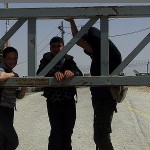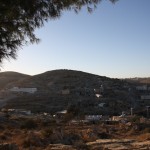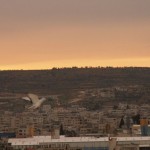
Filmed and produced by Cat Rabenstine for the Christian Peacemaker Teams in Palestine.
Life in the West Bank

Filmed and produced by Cat Rabenstine for the Christian Peacemaker Teams in Palestine.

CPTnet Digest
4 January 2011
A newsletter written by members of Christian Peacemaker Teams and Operation Dove.
Operation Dove (Nonviolent Peace Corps of Association “Comunit” Papa Giovanni XXIII) and Christian Peacemaker Teams (CPT) announce the publication of the 2009-2010 report on the Israeli military escort to the Palestinian schoolchildren from the villages of Tuba and Maghayir al-Abeed.
An average of eighteen Palestinian children from the villages of Tuba and Maghayir al Abeed attend school in the neighbouring village of At-Tuwani.
To reach school, the children typically use the primary road that connects their villages with At-Tuwani and passes between the Israeli settlement of Ma’on and the Israeli outpost of Havat Ma’on (Hill 833).
Since 2001, Israeli settlers from Havat Ma’on have routinely attacked the children on their journey to and from school, but it was not until November 2004 that Israeli authorities established a daily military escort.
Despite the Israeli military escort, the children have been victims of violence 104 times between November 2004 and June 2010.
The soldiers carrying out the escort have at times failed to protect the children and have frequently arrived late, causing the children to wait, sometimes for hours, before and after school.
During the 2009-2010 school year, children missed almost twenty-seven hours of school and waited fifty-three hours for military escort after school.
In addition, the soldiers regularly failed to provide a complete escort of the children, almost always leaving the children to walk unescorted beside settlement buildings, in an area where settlers have attacked them.
Despite the children’s right to access education, the military fails to provide a consistent escort for the children. When the military does not arrive, the schoolchildren must take alternative routes that take up to two hours by foot through a rocky, hilly landscape. Furthermore, settlers attack the children and their relatives on these longer paths.
Members of Operation Dove and Christian Peacemaker Teams have had a continuous presence in the village of At-Tuwani since 2004 and daily monitor the military escort of the schoolchildren.
The report, “The Dangerous Road to Education. Palestinian Students Suffer Under Settler Violence and Military Negligence” is available as a PDF. Click here for the PDF document.

CPTnet 17 December 2010
A newsletter written by members of the Christian Peacemaker Teams.
SOUTH HEBRON HILLS  On 14 December 2010, the Israeli military demolished three water cisterns and two wells in the arid and hilly Khashem Ad Daraj/Hathaleen region, about twenty-six km southeast of Hebron/al-Khalil on Tuesday. The military gave no reason for the destruction of the wells and cisterns.
The demolitions follow a pattern of destruction of Palestinian property by the Israeli military in the Oslo Accords-defined Area C.
The Israeli army failed to deliver demolition orders to the residents of the villages in the area and instead left them under a stone two days earlier for the residents to find.
The demolished cisterns and wells supplied drinking water to the villagers as well as their sheep and goats, the primary sources of food and income for the villages in the area.
The wells were up to 300 meters deep and over seventy years old, pre-dating the 1967 occupation of the Palestinian Territories. The Israeli military claims that it does not destroy structures created before 1967.
The region receives an average yearly rainfall of between 150-250 mm.*
*Applied Research Institute, Jerusalem & United Nations World Food Programme. February 2010 Report.

CPTnet Volume 36, Issue 3
A newsletter written by members of the Christian Peacemaker Teams
This autumn, a local businessman alerted three CPTers to the presence of a group of soldiers outside the Ibrahimi School, located in the heart of the Old City.
Upon arrival, the school principal informed CPT that a settler boy, around seven years old, had accused two Palestinian boys from the Ibrahimi School of throwing a rock at him.  Soldiers wanted to enter the school with the settler child to identify and arrest the Palestinian boys, and the school principal responded by saying they would first need to get
permission from the Palestinian Minister of Education.
Over a period of three hours, fifty Israeli soldiers, twenty settlers and Israeli police gathered outside the school. When the Palestinian Ministry of Education told the soldiers that they could not enter the school, the Israeli army disregarded his decision and entered the school with the settler boy in tow.
Two Palestinian boys under the age of eighteen were arrested in front of their peers and taken to the local police station. The Israeli army and police informed the Minister of Education that these arrests were necessary for “maintaining the peace,” because the group of settlers gathered outside the school had threatened to remain and harass the school
children if the police did not arrest the Palestinian boys.
Over the years, people on the Hebron team have witnessed settler children attack Palestinian children many times, and to the best of our knowledge, no police officer has ever taken a Palestinian child into an Israeli school to point out his/her attackers.  Indeed, when adult Palestinians and internationals provide documentation of settler children attacking Palestinian children and adults, police and soldiers usually dismiss them rudely.
The Ibrahimi School incident not only shows the lack of impartiality on the part of the police, but also that settler accusations supersede preserving the educational environment of Palestinian children.
The entry of soldiers into educational institutions signifies to children that schools are not safe places for them, thus creating further barriers to education.
The young settler boy that made the rock throwing accusation was prompted by his father and other adult settlers to demand entry into the Ibrahimi School during school hours. Settler adults brought a number of settler children with them to the school and refused to obey the soldiers instructions for children to leave the scene.
Children need safe environments where they can learn and grow. Unfortunately, what CPT observes here in Al-Khalil is that children, both Palestinian and Israeli, are not being brought up in a spirit of love or respect for others.
The Israeli authorities in this area are not preparing children for a life of peace, tolerance, and equality — a life that all children deserve.
For footage of the Ibrahimi school incident, click here

ISRAELI SOLDIERS DETAIN FIVE PALESTINIAN SCHOOL BOYS IN SOUTH HEBRON HILLS
[Note: According to the Fourth Geneva Convention, the Hague Regulations, the International Court of Justice, and several United Nations resolutions, all Israeli settlements and outposts in the Occupied Palestinian Territories are illegal. Most settlement outposts, including Havat Ma’on (Hill 833), are considered illegal also under Israeli law.]
November 21st, 2010
At-Tuwani – Christian Peacemaker Teams Press Release: Claiming that the children were throwing stones, Israeli soldiers detained five Palestinian schoolboys.
Since the beginning of 2005, the children from the village of Tuba wait every morning for an Israeli army escort to accompany them to the school in At-Tuwani, along the shortest road that goes through the Israeli settlement of Ma’on and the illegal outpost of Havat Ma’on. The escort’s task is to protect the children from the violence of the Israeli settlers of Havat Ma’on.
On the morning of November 21st, Palestinian schoolchildren had been waiting for over an hour near the settlement chicken barns when, at about 8:50 am, the soldiers arrived to escort the children to school past Havat Ma’on. Instead of escorting the children, however, the soldiers stopped and talked with the settlement security guard while the children waited on the road nearby. While the soldiers and the security guard were talking, two settlers passed the children.
After waiting for 15 minutes, two of the schoolchildren left for school on their own, unaccompanied. The other 13 children waited for another five minutes, then turned around and left to head back home. The soldiers remained with the security guard.
As the children were arriving at their villages of Tuba and Maghayir Al-Abeed, the same soldiers drove up, and, shoving away two internationals from Christian Peacemaker Teams, grabbed five boys and put them in the army vehicle. The soldiers took the boys back to the settlement barns, where, according to the children, they asked them no questions, but made them sit against a barn. After holding them for 15 minutes, the soldiers released the boys.
As the boys were leaving, the captain told the internationals “tell the children’s parents that if the boys throw stones again, it won’t be like this time. There will be problems.”
“I was waiting with the kids for over an hour, and I never saw them throw stones” said Joe Yoder, member of CPT. “Even if they were throwing stones while they were playing around, I don’t see how that’s an offense that merits soldiers coming into their home and carrying them off like criminals. If the army would just arrive on time, then there wouldn’t be a problem in the first place.”
Schoolchildren from Tuba and Maghayir al Abeed rely on the Israeli army to escort them past the settlement of Ma’on and the illegal outpost of Havat Ma’on, where Israeli settlers have committed acts of violence against the schoolchildren in the past.
These kinds of incidents are the evidence of the Israeli military escort’s failure to protect the children from settler’s violence. In the last school year, the children were attacked 19 times, they waited for the escort 53 hours and they missed almost 27 hours of classes.
A more detailed report about the military escort of schoolchildren in South Hebron Hills will be published in the next few weeks.
Christian Peacemaker Teams and Operation Dove have maintained an international presence in At-Tuwani and South Hebron Hills since 2004.

CPTnet Digest
A newsletter written by members of the Christian Peacemaker Teams
5 November 2010
SOUTH HEBRON HILLS: Israeli Army arrests young Palestinian man in South Hebron Hills
[Note: According to the Fourth Geneva Convention, the International Court of
Justice, and several United Nations resolutions, all Israeli settlements and
outposts in the Occupied Palestinian Territories are illegal. Most
settlement outposts, including Havat Ma’on (Hill 833), are illegal under
Israeli law.]
On the morning of Saturday, 30 October 2010, around 10:30 a.m., Israeli
soldiers arrested a young Palestinian man from the village of Tuba, in the
South Hebron Hills, who had been filming Israeli soldiers chasing two young
Palestinian shepherds from Tuba.
The two shepherds, accompanied by internationals of Operation Dove (the
nonviolent corps of the Italian organization Community Pope John XXIII), were
watching their flocks in the Umm Zeitouna area, on private Palestinian land.
Around 10:00 a.m., a group of Israeli activists from Ta’ayush joined the
internationals accompanying the shepherds. After about ten minutes, three
military jeeps and two armored cars from Israeli army, the DCO (District
Coordination Office of the Israeli military) and Israeli police arrived,
surrounding the whole area. After a few minutes, Israeli soldiers came down
from the hilltop into the valley, chasing the two Palestinian shepherds, who
ran quickly toward their village.
Israeli activists and internationals tried to speak with soldiers, explaining, that the two shepherds were on Palestinian-owned land and, according to Israeli law, it is illegal to prevent Palestinians from accessing their land.
Nevertheless, the Israeli army continued chasing shepherds until they reached Tuba village as the young Palestinian man, who was working for Israeli human rights organization B’tselem, videotaped the action.
Soldiers then surrounded the Palestinian, detained him, and forced him to follow them to the Israeli-only bypass road, preventing him from answering his cell phone. They then took the young man to a military base close to the nearby Susiya settlement, detaining him for five hours.
After his release, the Palestinian told internationals he was blindfolded and handcuffed for a long time, and refused permission to make phone calls.  None of the soldiers were able to speak Arabic and they were not willing to speak with him in English.
Operation Dove and Christian Peacemaker Teams have maintained an international presence in At-Tuwani and South Hebron Hills since 2004.

CPTnet Digest, Volume 35, Issue 1
A newsletter written by members of the Christian Peacemaker Teams
29 October 2010
AL-KHALIL (HEBRON): Shepherd made homeless, livelihood threatened, son in prison.
On Monday 11 October, at 8.00 a.m. the Israeli military arrived at the home
of Noah al-Rajabi in Bani Naim without warning and destroyed the family’s
water cistern, tent, and a small wooden structure family members used for
cooking and storage.
Al-Rajabi told CPTers, who visited after the incident, that soldiers kicked
and beat some of the animals and that one pregnant ewe aborted. Â When his
fourteen-year-old son objected to their actions, soldiers arrested him,
accusing him of “obstructing the military” and scratching a soldier’s
face.
Ten weeks earlier, the Israeli military demolished al-Rajabi’s house. His
wife and the younger of his seven children now live in two rented rooms in
Hebron. Al-Rajabi and his oldest son remained in a tent supplied by the Red
Cross, so that they could continue working with his flock.
CPTers met al-Rajabi in Hebron on 12 October. He did not know where his son
was being held, or where he could get water for his animals. They
accompanied him to three Israeli police stations. The only information
Israeli police gave them was that his son was being held in Ofer military
prison. They refused to accept a complaint against the Israeli soldiers for
their behaviour.
CPTers also visited Al-Rajabi’s rented accommodation in Hebron where they
met his wife and some of his other children. “Please bring my son
home,” his wife pleaded with them.
Al-Rajabi’s brother has been watching his sheep and goats, and has moved
them to another hillside where there is water. Agencies in Hebron are
trying to reconnect Noah’s water supply, but the cistern will have to be
rebuilt, and will run the risk of demolition in the future.
For further information on the imprisonment of Palestinian minors by the
Israeli military, please refer to the annual reports of Defence for Children International (Palestine).

CPTnet Digest, Volume 32, Issue 3
A newsletter written by members of the Christian Peacemaker Teams
Edited from a release provided by Operation Dove
5 August 2010
[Note: According to the Fourth Geneva Convention, the Hague Regulations, the International Court of Justice, and several United Nations resolutions, all Israeli settlements and outposts in the Occupied Palestinian Territories are illegal. Most settlement outposts, including Havat Ma’on (Hill 833), are considered illegal also under Israeli law.]
On 21 July, three settlers stole a sheep from a young Palestinian shepherd while he was watering his flock at a well situated in Umm Zeitouna valley, located between the Israeli settlements of Ma’on and Karmel. According to the shepherd, a resident of Tuba village, two Israeli settler vehicles stopped on the nearby settler bypass road. A settler exited from one of the vehicles, walked toward the shepherd’s flock, grabbed a sheep by the ear and dragged the animal a few yards. He then loaded the sheep onto his shoulders and walked back to the road, where two other settlers, one of them armed, were waiting. The settlers loaded the animal into a vehicle. During this time the shepherd remained at a distance filming the theft with a video camera from the Israeli human rights association B’Tselem, given to Palestinians in the area to document attacks by settlers.
The young Palestinian pointed out that during the theft, on the road not far from the settlers cars, there was an Israeli military jeep. Although the soldiers were present during the incident they left the scene without intervening. The shepherd then reported the theft of the sheep to Israeli police, who arrived on the scene with Ma’on settlement’s security guard and two other settlers identified as Havat Ma’on residents. The police refused to talk to the shepherd who wanted to make a complaint, saying they did not know Arabic or English and insisting on speaking with the boy’s father, although he was not present at the time of the robbery. A few minutes later the police went to the village of Tuba to pick up the father and bring him to the police station in Kiryat Arba. The father was fingerprinted, photographed, and threatened with a fine, but was not permitted to give testimony. Then the young shepherd, accompanied by international volunteers, followed his father to the Israeli police station to make a complaint and submit the video from the incident.
Episodes like this are frequent in the South Hebron Hills, where settlers from the settlements and the outposts attack Palestinian shepherds and farmers to intimidate and force them to leave their lands. These kinds of illegal actions are usually left unpunished and many of them occur with Israeli military and police complicity. The Palestinian communities of this area have chosen to nonviolently resist the continuous abuses of the Israeli settlers and military.
Operation Dove and Christian Peacemaker Teams have maintained an international presence in At-Tuwani and the South Hebron Hills since 2004.

CPTnet Digest, Volume 31 Issue 20
A newsletter written by members of the Christian Peacemaker Teams
30 July 2010
The Israeli military seized local and international nonviolent activists trying to regain Palestinian access to a local street in Al Khalil (Hebron) on 24 July 2010.  About 100 Palestinians, Israelis and internationals had gathered for the weekly “Open Shuhada Street” demonstration in a plaza near the Beit Romano settlement and checkpoint. Two dozen Israeli soldiers had blocked three of the streets leading into the plaza; Border police were also present.
As the activists began to walk down the remaining street, Israeli soldiers and police followed.  Several soldiers dashed into the crowd to seize demonstrators.  CPTers observed soldiers grabbing activists around the neck and violently pushing observers.  One participant reported that soldiers pulled an international by her hair as she covered the body of another woman to protect her on the ground. Another reported being struck in the head by a soldier who approached from behind.
After the Palestinian leadership announced the end of the demonstration and urged participants to go home, soldiers continued to follow the departing demonstrators down the street and fired a sound grenade.  By the end of the episode, Israeli Military and police had arrested six activists: three French
nationals, a Swede, an Israeli and a Palestinian.
Thirty activists proceeded to Kiryat Arba police station, where the police were holding those arrested. The activists remained there three hours, trying to offer evidence on behalf of the arrested men and to file complaints against violent treatment from soldiers. The police refused to admit any
activists. At 11:00 p.m. they released the Swede. The Israeli and the three Frenchmen were released later. One Frenchman was deported; the other two were banned from the West Bank. Their fines totaled 20,000 shekels. The Palestinian was held and released after two days.
The “Open Shuhada Street” campaign kicked off on 22 February 2010, with demonstrations in Hebron and other cities around the world. Since then, Palestinians, Israelis and internationals have held weekly demonstrations in Hebron’s Old City every Saturday at 4:00 p.m. with chanting, drumming,
speeches and dancing. The campaign aims to reopen Shuhada Street to Hebron’s Palestinian residents.
Shuhada Street was a central, thriving marketplace of Hebron until 2000. Three Jewish settlements have grown along the street since 1979, interspersed with what were Palestinian shops.
In 2000 the street was closed to Palestinians, and even though the U.S. Agency for International Development renovated it for both Palestinian and Israeli use in 2004, it was subsequently declared a settler-only street. Israeli settlers and authorities have not only confiscated Palestinian buildings or welded shut the entrances, they now also control all the market and parking spaces connected to Shuhada Street. These lots once provided Hebron?s Palestinian community with meat and vegetable markets and accessibility to the Old City. Their closure to Palestinians has hurt the
local economy.
The Shuhada St. demonstrations bring together diverse groups nonviolently resisting the Occupation. During an evaluation session, a lead organizer summing up their resolve following the day’s events, said, This campaign must succeed.
Photos: http://cpt.org/index.php?q=gallery&g2_itemId=20991
———————————————-
CPT’s MISSION: What would happen if Christians devoted the same discipline and sacrifice to nonviolent peacemaking that armies devote to war? Christian Peacemaker Teams (CPT) seeks to enlist the whole church in organized, nonviolent alternatives to war and places teams of trained peacemakers in regions of lethal conflict.
COMMENTS: To ask questions or express concerns, criticisms and affirmations send messages to peacemakers@cpt.org.
NEWSLETTER: To receive CPT’s quarterly newsletter by email or in print, go to
http://cpt.org/participate/subscribe
DONATE: Donate to CPT on-line with your credit card! Go to
http://cpt.org/participate/donate

CPTnet Digest, Volume 31 Issue 19
A newsletter written by members of the Christian Peacemaker Teams
29 July 2010
The Bedouin village of Al-Arakib, visited by a CPT delegation on July 25, was demolished at 5:30 a.m. on July 27. Â Authorities arrived with around 1500 Israeli police armed with tear gas, a water cannon, dozens of vehicles, two helicopters and five bulldozers. Within three hours all the homes and outbuildings, as well as the village’s water supply and hundreds of olive trees, were demolished.
Before the demolition, Israeli and Palestinian allies to the Bedouins got word out to Jewish activists for support of the Bedouins, who are Israeli citizens, in protest to the demolition. One hundred and fifty activists along with some large news organizations including BBC, Al-Jezeera and Ynet were witnesses to this atrocity.
The demolition has left 300 Bedouins, mainly children, homeless; but as soon as the police left they began rebuilding their homes. Shlomo Tziser, an official with the Land Administrator’s southern district, was quoted in local media as saying, “Should the Bedouins return we’ll do it again.”
A July 15 demolition order had given Al Arakib residents 30 days to leave their village or be forcibly evicted. Bedouins whose houses had been demolished on other occasions reported demolitions occurring in time frames shorter than those in the legal notices. About 160,000 Bedouins currently live in the Negev. Fifty percent live in townships created by the government in the 1960s in an effort to remove the traditionally agricultural people from ancestral lands and relocate tribes into small, contained communities in order to transfer ownership to the State. Some of the land is given to Jewish families for farming; some simply reverts to State possession.
More information about the Negev’s Bedouin people and their struggle for survival is available from the Negev Coexistence Forum (www.dukium.org).
———————————————-
CPT’s MISSION: What would happen if Christians devoted the same discipline and sacrifice to nonviolent peacemaking that armies devote to war? Christian Peacemaker Teams (CPT) seeks to enlist the whole church in organized, nonviolent alternatives to war and places teams of trained peacemakers in regions of lethal conflict.
COMMENTS: To ask questions or express concerns, criticisms and affirmations send messages to peacemakers@cpt.org.
NEWSLETTER: To receive CPT’s quarterly newsletter by email or in print, go to
DONATE: Donate to CPT on-line with your credit card! Go to http://cpt.org/participate/donate